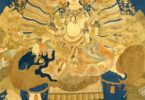《百喻经》
[The] Sūtra [Of A] Hundred Parables
(六)子死欲停置家中喻
(6) Parable [Of Having A] Son Dead, Desiring [To] Leave [And] Put [Him] At Home
昔有愚人养育七子,一子先死。时此愚人见子既死,便欲停置于其家中,自欲弃去。
[In the] past, [there] was [a] foolish person [who] nurtured seven sons, [with] one son first dying. Then, this foolish person, seeing [that] since [the] son [has] died, then desired [to] leave [and] put [him] within his home, personally desiring [to] abandon [him to] go [away].
傍人见已而语之言:「生死道异,当速庄严致于远处而殡葬之,云何得留自欲弃去?」
[A] bystander, seeing [this] already, then spoke these words, ‘[As the] living [and] dead [have] paths different, [you] should quickly [and with] dignity send [him] to [a] faraway place and bury him. How can [you] leave [him], personally desiring [to] abandon [him to] go [away]?’
尔时愚人闻此语已即自思念:「若不得留要当葬者,须更杀一子停担两头乃可胜致。」于是便更杀其一子,而担负之远葬林野。
At that time, [the] foolish person, hearing these words already, then personally thought, ‘If [I] cannot leave [and] should bury him, [I] must also kill one [more] son. Putting [and] shouldering [them on] two ends, thus can [they be] successfully sent [off].’ Thereupon, [he] then also killed one [more of] his sons, and shouldered them [to] that faraway burial forest [in the] wild.
时人见之,深生嗤笑怪未曾有。
[The] people [at that] time, seeing this, gave rise [to] great sneering [at his] oddness, never before [seen].
譬如比丘私犯一戒,情惮改悔,默然覆藏自说清净,或有知者即语之言:「出家之人守持禁戒如护明珠不使缺落,汝今云何违犯所受欲不忏悔?」
For example, Bhikṣus [who] privately violate one precept, feeling dread [of] correction [and] repentance, silently cover [and] hide [them], personally saying [they are] pure. Perhaps, [there] are those [who] know, then speaking these words, ‘[As] people [who have] left [the] household life [should] guard [and] uphold [the] prohibitive precepts like protecting bright gems, not causing [them to be] incomplete [with those] missing, how [can] you now violate those received [and] desire [to] not repent?’
犯戒者言:「苟须忏者,更就犯之然后当出。」遂便破戒多作不善,尔乃顿出。
Those [who have] violated precepts say, ‘If that needs repentance, [of] even more, [I will] right away violate them, after that then confessing.’ Immediately breaking many precepts, doing [that which is] not good, thereupon immediately confessing.
如彼愚人一子既死又杀一子,今此比丘亦复如是。
Like that foolish person, [with] one son since dead, also killing one [more] son, now these Bhikṣus, [are] likewise thus.
[Note: Precepts are usually discreetly broken and concealed precisely because those who do so know they should be neither broken nor with the broken concealed. To do so is to go against one’s conscience, one’s Buddha-nature (佛性). To stringently uphold the precepts like they are each a precious treasure not to be damaged or lost is to be aligned with Buddha-nature instead.
It is with immediate confession and repentance for any one precept violated, that that particular precept, along with others, are upheld well. If there is deliberate adding of moral transgressions with more broken precepts before confessing them in one go, such confession is accordingly less likely to be sincere, just as the repentance that follows is accordingly less likely to be genuine. This harms one’s spiritual progress, while harming others affected by the broken precepts.]
Namo Amituofo : Translation and notes by Shen Shi’an
上个喻
Previous Parable:
渴见水喻
[5] The Parable Of The Thirsty Seeing Water
https://purelanders.com/2023/07/25/5-the-parable-of-the-thirsty-seeing-water-from-the-sutra-of-a-hundred-parables
下个喻
Next Parable:
认人为兄喻
[7] The Parable Of Recognising A Person As One’s Brother
https://purelanders.com/2023/07/26/7-the-parable-of-recognising-a-person-as-ones-brother-from-the-sutra-of-a-hundred-parables
全百喻
All Hundred Parables:
https://purelanders.com/baiyu





